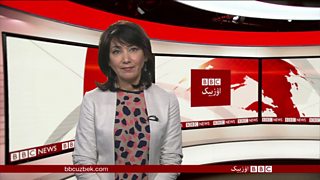
As Βι¶ΉΤΌΕΔ Uzbek TV launches for Afghanistan’s Uzbek-speakers, Βι¶ΉΤΌΕΔ Uzbek journalist, Luiza Khudaykulova - known to radio and TV audiences as Luiza Iskandariy - blogs about her relationship with Afghanistan.
Thirty-eight years ago, in September 1979, I was a proud first-year student of Dari language and literature at the University for Oriental Studies in Tashkent, Uzbekistan. The majority of my peers were keen to get into the Arab or Hindi faculties, but I chose to go against the flow and was about to start my studies in two subjects that I had always liked: languages and literature. The language I had chosen, Dari, was spoken in the country which, a few months later, was to become the hottest topic on the international agenda. Afghanistan.
When the USSR invaded Afghanistan, my teenage vision of the situation there was shaped by the Soviet propaganda and lack of objective information: a war is going on in this neighbouring country, people are in trouble, and my country has sent a “limited contingency” of its armed forces – made up of “internationalist fighters” – to help them. So I thought, being a student of Dari, I could play my part in helping the Afghan people to resolve the conflict, restore peace and move towards progress and prosperity.
Soon the girls and the boys studying the Afghan languages found themselves facing different options. The boys from our faculty were whisked off to Afghanistan to work as interpreters for the Soviet military and their advisors. Many of those boys never returned from that war. Girls, however, were not in demand: twice I applied for an opportunity to work there, and both times received the same response: “not possible”. Eventually, you could only see us, girls, in our faculty lecture rooms.
But there still were ways for me to nurture my keen interest in Afghanistan. Every year during my student holidays, I applied to work as an interpreter at summer pioneers’ camps for Afghan children in Uzbekistan. These trips were organised by the Soviet authorities as part of their effort to cultivate future generational support for the Soviet ideology in Afghanistan. Meeting those kids from Kabul, Mazari-Sharif, Herat and beyond, was a great opportunity for me to improve my conversational Dari – and also to learn about their lives, their culture, their country.
After graduation, I went on to interpret for Afghan party officials and youth workers visiting Uzbekistan. It was my Afghan connection that introduced me to broadcasting as I started to work on Uzbek state radio programmes in Dari. As all the Soviet media were under strict control of the state, all our scripts would come via fax directly from Moscow. We had to translate them word by word and every translation would go through scrutiny of a censor. Every single broadcast was scrupulously pre-recorded lest any word out of the official party line be aired. For me that job was mainly a big exercise to practice my language, with no journalism or creativity involved.
Soon after that I started lecturing at the University – it was a great opportunity to pass on my knowledge of Dari language and literature. By then Soviets stopped sending extra troops and specialists to Afghanistan, and my students were lucky to stay in their classrooms.
Just as the start of my “Afghan link” fell on the start of the Soviet invasion of Afghanistan, the withdrawal of the Soviet troops in 1989 coincided with me seeking and trying out different paths for my career. But years later, Afghanistan was to take centre stage in my professional life once again.
In March 2003, Βι¶ΉΤΌΕΔ Uzbek – which I had joined in 1995 - started broadcasts for Afghanistan’s Uzbek-speakers, adding the Uzbek-language element to the Βι¶ΉΤΌΕΔ’s already strong presence in Afghanistan: in Pashto and Dari – via the Βι¶ΉΤΌΕΔ Afghan service – and via Βι¶ΉΤΌΕΔ Persian. I worked as producer and presenter for radio programmes aimed at this audience.
And it was as a Βι¶ΉΤΌΕΔ Uzbek journalist that I got to visit Afghanistan for the first time. I was part of a Βι¶ΉΤΌΕΔ Media Action project of training local female journalists to gather stories and conduct interviews for Zan va zaman (referred to in English as Afghan Woman’s Hour) - a very popular programme of the Βι¶ΉΤΌΕΔ Afghan service aired in Pashto and Dari. One of the trainees was Sana Safi who - a teenager at the time - had travelled to Kabul all the way from Nangarhar, in the country’s east, to take part in our very first training. She is now one of the presenters of the Βι¶ΉΤΌΕΔ Pashto TV programme, Βι¶ΉΤΌΕΔ Naray Da Wakht. More than 1.3m people follow her on social media while the TV programme is watched in Afghanistan by 2m people every week.
It is September 2017 now, and my Afghanistan connection has taken a wonderful new dimension for me as I “return” to the country, this time via its TV screens. What started all those years ago as a desire to learn Dari has led me to bringing news in Uzbek on TV to the Afghans who share with me my mother tongue. Day in and day out, as I start our evening bulletin with “Londondan Βι¶ΉΤΌΕΔ yangiliklarini tomosha qilmoqdasiz” (“You are watching Βι¶ΉΤΌΕΔ news from London”), I’ll be connecting again and again with the people of the country that will never stop to fascinate me. And I know I’ll never stop learning about Afghanistan and its people.
Luiza Khudaykulova produces and presents Βι¶ΉΤΌΕΔ Uzbek TV news programmes, Monday to Friday, broadcast on Arezo TV in Afghanistan
- Read also
